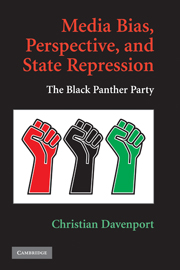Book contents
- Frontmatter
- Contents
- Figures and Tables
- Preface and Acknowledgments
- Media Bias, Perspective, and State Repression
- INTRODUCTION
- Part I Conceptualization
- Part II Cases
- 4 THE BLACK PANTHER PARTY VS. THE UNITED STATES, 1967–1973
- 5 AN EVENT CATALOG OF DISSENT AND REPRESSION
- 6 A MOSAIC OF COERCION
- Part III Conclusion
- Appendix: The Black Panther–U.S. Government Event Catalog
- Bibliography
- Index
5 - AN EVENT CATALOG OF DISSENT AND REPRESSION
THE BPP IN THE BAY AREA
Published online by Cambridge University Press: 05 June 2012
- Frontmatter
- Contents
- Figures and Tables
- Preface and Acknowledgments
- Media Bias, Perspective, and State Repression
- INTRODUCTION
- Part I Conceptualization
- Part II Cases
- 4 THE BLACK PANTHER PARTY VS. THE UNITED STATES, 1967–1973
- 5 AN EVENT CATALOG OF DISSENT AND REPRESSION
- 6 A MOSAIC OF COERCION
- Part III Conclusion
- Appendix: The Black Panther–U.S. Government Event Catalog
- Bibliography
- Index
Summary
Event catalogs have long figured centrally in empirical studies of political struggle. European and American governments began collecting official reports on work stoppages during the later nineteenth century. From that point on, statistically minded analysts began conducting quantitative analyses of industrial conflict based on government data. Not until after World War II, however, did analysts dealing with other forms of struggle start constructing parallel data sets for revolutions, coups d'état, international wars, civil wars, and domestic collective violence.
Charles Tilly “Event Catalogs as Theories,” Sociological Theory (2008)Adopting the Rashomon approach, identifying combatants, their strategies, as well as the historical context, provides only part of the story. The other part concerns the observers who recorded and distributed information about the conflict itself – in this case, newspapers. Several of the sources examined in my study are familiar to those in the event catalog tradition (in particular, The New York Times – the benchmark by which most catalogs are assessed). Most presses employed within the current research, however, have never been used in the relevant literature (e.g., local, ethnic, alternative, and radical presses). The diversity of the newspapers used here is significant for it provides us with a wide variety of perspectives regarding the interaction between the BPP and the authorities. After first providing an overview of all newspapers available in the Bay Area during the 1960s and the1970s and specifically those employed within the current research, I discuss the event catalogs generated from this material.
- Type
- Chapter
- Information
- Media Bias, Perspective, and State RepressionThe Black Panther Party, pp. 107 - 126Publisher: Cambridge University PressPrint publication year: 2009



